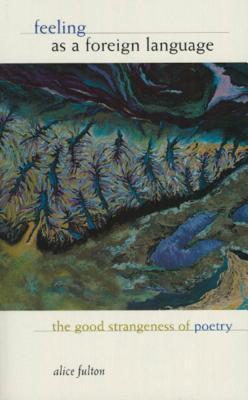In Feeling as a Foreign Language, award-winning poet and critic Alice Fulton considers poetry's uncanny ability to access and recreate emotions so wayward they go unnamed. How does poetry create feeling? What are fractal poetics?
In a series of provocative, beautifully written essays concerning "the good strangeness of poetry," Fulton contemplates the intricacies of a rare genetic syndrome, the aesthetics of complexity theory, and the need for "cultural incorrectness." She also meditates on electronic, biological, and linguistic screens; falls in love with an outrageous 17th-century poet; argues for a Dickinsonian tradition in American letters; and calls for a courageous poetics of "inconvenient knowledge." Contents Preamble I. ProcessHead Notes, Heart Notes, Base Notes Screens: An Alchemical Scrapbook II. Poetics
Subversive Pleasures Of Formal, Free, and Fractal Verse: Singing the Body Eclectic Fractal Amplifications: Writing in Three Dimensions III. Powers
The Only Kangaroo among the Beauty Unordinary Passions: Margaret Cavendish, the Duchess of Newcastle Her Moment of Brocade: The Reconstruction of Emily Dickinson IV. Praxis
Seed Ink To Organize a Waterfall V. Penchants
A Canon for Infidels Three Poets in Pursuit of America The State of the Art Main Things ri0
VI. Premises
The Tongue as a Muscle A Poetry of Inconvenient Knowledge
